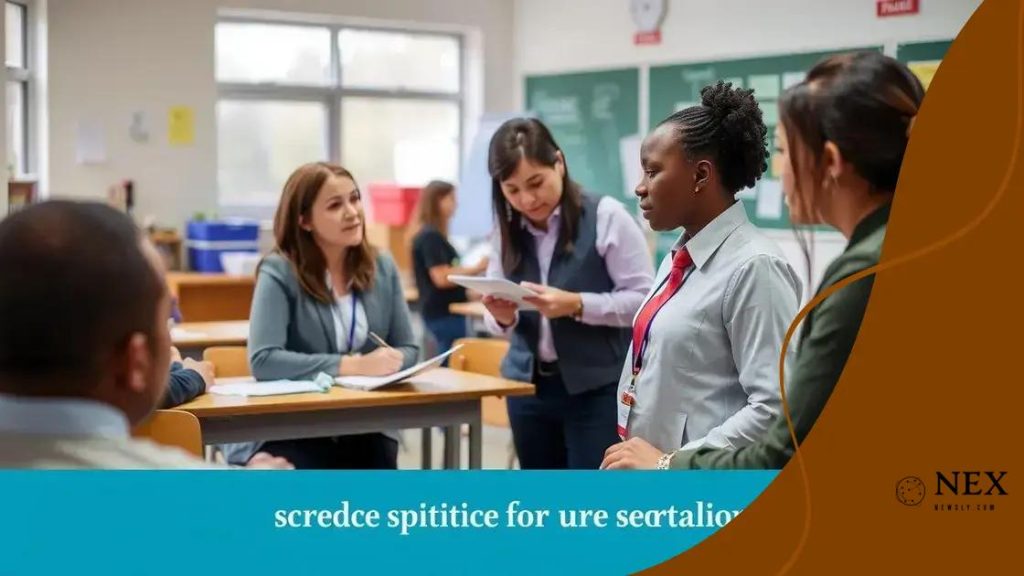Ofsted inspection changes: What you need to know

Anúncios
The recent Ofsted inspection changes emphasize holistic education, focusing on student well-being, community engagement, and continuous improvement in teaching practices to meet new evaluation criteria.
Ofsted inspection changes are on the horizon, bringing new standards and expectations for schools. What do these changes mean for educators, students, and parents? This article dives into the key updates and their implications.
Anúncios
Understanding the recent Ofsted inspection changes
The recent Ofsted inspection changes are significant. These updates aim to improve the quality of education in schools across England. Understanding these changes is essential for educators, parents, and students.
Key Changes in Ofsted Inspections
One major update is the shift in focus towards a more holistic approach to education. Inspections now consider a wide range of factors beyond academic performance.
- Emphasis on student well-being
- Inclusion of curriculum quality
- Assessment of school culture and environment
- Greater input from student feedback
These elements help create a comprehensive view of a school’s effectiveness. Moreover, schools are encouraged to engage with students and parents more actively than before.
Anúncios
Impact on Schools
The implications of these changes are profound. Schools may need to adapt their teaching strategies and policies to align with the new expectations.
This adaptation might include integrating programs that promote mental health and well-being. Schools will also be expected to create an inclusive environment that fosters a sense of belonging for every student. Understanding how to navigate these requirements will be crucial for school leadership.
With these updates, Ofsted places a spotlight on continuous improvement. Schools are now more accountable for the educational experience they provide. Leaders will need to develop effective strategies to meet these expectations successfully.
How do these changes affect schools?
The recent Ofsted inspection changes are set to impact schools in various ways. Understanding these effects is crucial for educators and administrators as they navigate this new landscape.
Changes in Evaluation Criteria
One significant change is the revised evaluation criteria. Schools will now face increased scrutiny on aspects such as student engagement and the curriculum’s breadth. This means they must ensure a well-rounded education that addresses not only academics but also personal development.
- Enhanced focus on social and emotional learning
- Greater emphasis on extra-curricular activities
- Requirements for a diverse and inclusive curriculum
These criteria encourage schools to think beyond standardized testing and push for holistic student development.
Impact on Teaching Strategies
Teachers will need to adapt their strategies in response to these changes. The shift will likely require innovative approaches to engage students more effectively. This might include incorporating technology into lessons or offering more hands-on learning experiences.
Additionally, teachers may have to focus more on creating a positive learning environment. Building relationships with students will become even more vital to meet inspection standards and foster student well-being.
Moreover, professional development for teachers will be key. Educators may need training to adapt to new expectations and ensure they are well-equipped to provide the necessary support.
Accountability and Support Systems
With the new inspection framework comes heightened accountability. Schools may feel more pressure to perform, which could lead to increased stress among staff. However, this also presents an opportunity for schools to build stronger support systems.
Collaboration between teachers, school leaders, and the community will be essential. By working together, they can address challenges and create a more conducive learning environment.
- Support networks for teachers
- Community engagement initiatives
- Regular feedback loops with stakeholders
As schools adapt to these changes, they must balance accountability with a commitment to fostering a positive education experience for all students.
Implications for teaching staff and evaluations

The recent Ofsted inspection changes have profound implications for teaching staff and the evaluations they undergo. Understanding these implications helps educators prepare for what lies ahead.
Shifts in Teacher Evaluations
One of the significant changes is how teachers will be evaluated. Inspections will now focus more on the effectiveness of teaching methods and student engagement rather than just test scores. This shift means teachers must be proactive in adopting innovative techniques that foster active learning.
- Monitoring student participation
- Implementing diverse teaching strategies
- Encouraging critical thinking in the classroom
These evaluation criteria encourage teachers to step outside traditional teaching styles. This requires ongoing professional development and adaptability to new pedagogical approaches.
Support for Teaching Staff
As schools implement these changes, supporting teachers becomes essential. Professional development programs will play a crucial role in helping educators understand and meet the new expectations. Workshops, mentoring, and collaborative planning sessions can provide the necessary resources.
Building a supportive environment within the school is vital. Teachers should feel valued and equipped to handle the new challenges posed by the updated inspection framework. Collaboration among colleagues will also enhance teaching quality and morale.
Focus on Student Outcomes
The emphasis on student outcomes will impact teaching practices significantly. Teachers will need to clarify their goals and regularly assess their effectiveness. This means frequent feedback from students about their learning experiences will be critical.
Integrating student feedback will not only improve teaching methods but also create a more inclusive atmosphere in classrooms. Educators should feel empowered to experiment with new ideas that respond to students’ needs.
- Utilizing student questionnaires
- Adjusting lesson plans based on feedback
- Creating a culture of open dialogue
Overall, these implications require a commitment from teaching staff to engage in continuous improvement. Teachers will have opportunities to grow in their profession and enhance the learning environment significantly.
Parental and community responses to updates
The recent Ofsted inspection changes have sparked a range of responses from parents and the community. These updates affect not only schools but also the families and neighborhoods around them.
Parental Concerns and Support
Many parents have expressed concerns regarding these changes. They worry about how the new inspection criteria might impact the quality of education their children receive. These concerns often arise from the uncertainty about what the shifts mean for their child’s learning experience.
- Parents seek clarity on evaluation standards
- Desire for increased communication from schools
- Worries about added pressure on students and teachers
However, some parents are supportive of the changes, believing that a focus on overall student well-being is crucial. They feel that a well-rounded approach will benefit their children in the long run.
Community Engagement and Feedback
Communities are also reacting to the updates with a mix of curiosity and concern. Local community groups often organize meetings to discuss how these changes can affect schools and students. Engaging in dialogue allows parents and community members to voice their opinions and contribute valuable insights.
Moreover, effective communication between schools and communities will be more important than ever. Schools are encouraged to involve parents in decision-making processes and keep them informed about inspection outcomes.
- Community forums to address concerns
- Opportunities for parents to provide feedback
- Collaboration between schools and local organizations
As these updates are implemented, the role of the community in supporting schools will be crucial. Positive collaboration can create a stronger educational environment for students.
Impact on School-Community Relationships
The changes may also strengthen the relationship between schools and their communities. With a focus on holistic education, schools might engage more frequently with parents and local organizations. This kind of partnership can lead to positive outcomes for everyone involved.
When schools listen to community voices, they can tailor their programs and resources to better meet local needs. This collaboration emphasizes a shared commitment to the success of students, fostering a nurturing atmosphere for learning.
Future expectations for Ofsted inspections
The future expectations for Ofsted inspections are evolving as educational needs and standards change. It is essential for schools to understand what these expectations might entail.
Increased Focus on Holistic Education
One of the major shifts is the increasing emphasis on holistic education. Inspections will look beyond academics to consider a child’s overall well-being. This means schools will be evaluated on their ability to nurture social, emotional, and physical health.
- Assessment of school culture and safety
- Evaluation of mental health support services
- Promotion of a positive learning environment
Schools need to prepare for a more rounded approach that encourages creative programs and activities. They should develop strategies to integrate well-being into their curriculums.
Greater Community Engagement
Future inspections are likely to include a greater focus on community involvement. Schools will benefit from showcasing how they connect with families and local organizations. Engaging with the community helps provide a support network for students.
Schools might need to enhance their outreach initiatives and create partnerships with local businesses, charities, and other organizations. Building these relationships can foster a richer educational environment.
Continual Improvement Measurement
Ofsted will likely expect schools to demonstrate continual improvement over time. This means setting clear goals and defining how success is measured. Schools must be proactive in collecting data to show their growth in various areas.
- Regular self-evaluations by staff
- Student feedback mechanisms
- Transparent reporting to stakeholders
Understanding these future expectations helps schools prepare effectively for upcoming inspections. Being proactive in addressing these criteria can lead to better outcomes for students and satisfaction within the school community.
As we explore the future of Ofsted inspections, it becomes clear that schools must adapt to new expectations. The focus on holistic education, community engagement, and continuous improvement will shape how schools approach teaching and learning. By preparing proactively for these changes, schools can foster a positive environment for students, ensuring their success both academically and personally. Embracing these challenges will ultimately benefit the entire education system.
FAQ – Frequently Asked Questions about Ofsted Inspection Changes
What is the focus of the recent Ofsted inspection changes?
The recent changes emphasize holistic education, including student well-being, mental health, and overall school culture.
How will these changes impact teaching staff?
Teachers will need to adapt their methods to foster student engagement and demonstrate their effectiveness through innovative practices.
What role do parents play in these changes?
Parents are encouraged to be involved through feedback and community engagement, helping schools understand and meet local needs.
How can schools prepare for future inspections?
Schools can prepare by focusing on continuous improvement, engaging with the community, and developing a well-rounded educational approach.





